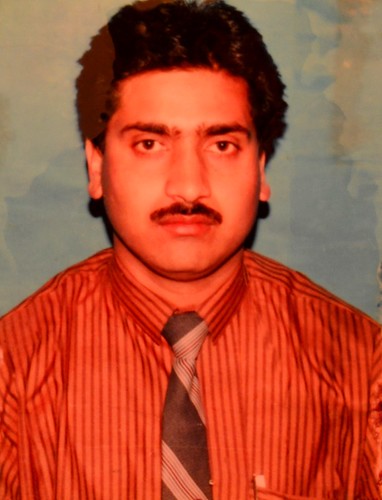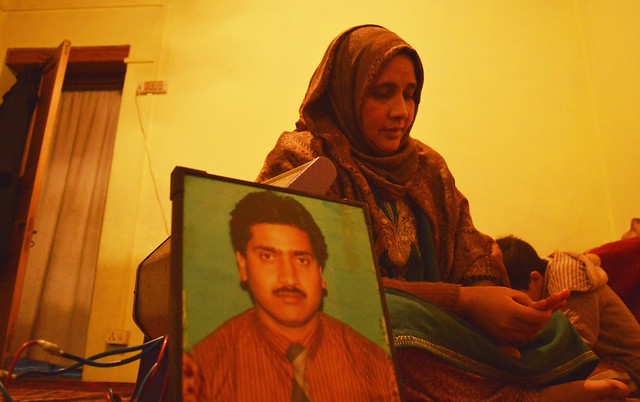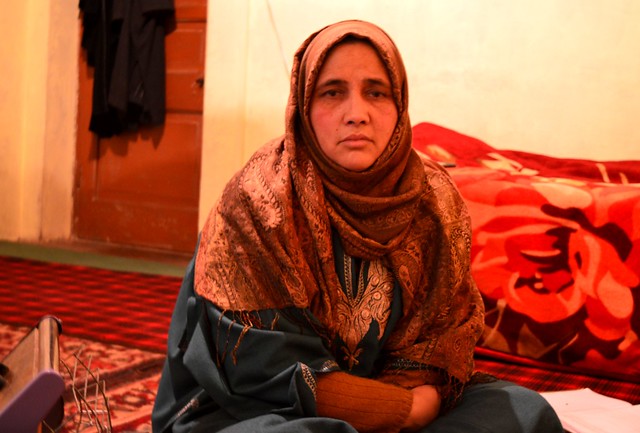In the last part of the three-part series, Raqib Hameed Naik narrates five personal stories of half-widows who saw their husbands picked up by Indian Security Forces, never to return. This is the story of Safiya Azad.
Rajbagh (Srinagar): The month of April is a signal of the change in weather in Kashmir, with cold, grey afternoons making way from crisp sunshine and clear skies. On April 20, 1993, Srinagar witnessed one such afternoon. In the Kursoo Rajbagh Area, the family of Himayoun Azad started their day early, like always, with male members leaving for their respective businesses.
Himayoun, the youngest among eight siblings wanted to visit his sister, who was married and lived in Lasjan, another area of Srinagar.
What happened during the day was to change the lives of the Azad family forever.
Himayoun Azad, then 22 years old, was the son of Ghulam Rasool Dar, who was a retired forest ranger and died when his youngest child was just two. But for Himayoun, life had begun again, or so it seemed. A year and a half ago, he had got married to Safiya, 17, who was also a relative. The two had a child six months earlier, and was named Dawood.

At around one in the afternoon, he decided to leave for Lasjan in his family car along with a friend. Before leaving, he asked his mother, Badkshan Begum, who was then in her 60’s, to wait for his return for lunch as his wife Safiya along with his six month old infant had gone to join her relatives for a ring ceremony in the vicinity.
Those words would haunt his mother for the rest of her life.
As Azad and his friend reached a picket on the Mehjoor Nagar Bridge–a five-minute drive from their residence–the soldiers of the 137th Battalion of the Border Security Force (BSF) stopped them and asked them for identities.
On examining the identity card of Himayoun, the guards dragged him out of the car, claiming they had prior information about his travel. The BSF soldiers bundled him into their vehicle and took him straight to their camp which was then located near New Convent school, Rajbagh.
A neighbor of Himayoun, who was witnessing these events from the other side of bridge, went straight to Azad’s wife and mother to inform them about what had happened. As the family members ran towards the bridge, they found his abandoned car. He had of course, already been taken to the BSF camp.
“While leaving for the ceremony, my husband had told me that he will come to join us in evening and these were his last words to me which have been echoing in my mind since last two decades,” says Himayoun’s wife Safiya.
The family members of Azad went to police station in Rajbagh to register a First Information Report (FIR) but they were directed to go to the Police station Sadar. The cops at the Rajbagh said they were powerless since the incident hadn’t happened in their jurisdiction. Without losing time, the family went to the concerned police station and registered an FIR against the BSF.
When they were heading back to their home, the alleys and roads surrounding their house were full of security forces. “I had never seen that much soldiers in my entire life. They didn’t allow us to go inside. After some time, a solider came outside on the direction of their Commanding Officer Sabarwal and asked me and my mother-in-law to come in,” recalls Safiya.
Safiya was locked inside the room where she saw that her other family members had already been confined. Azad’s mother was taken by the officer, and she saw Himayoun detained. He had been severely tortured and couldn’t stand. After being taken to the camp, where he was tortured, he had been brought back by the forces to his house.

Safia recalls officer Sabarwal’s words to her mother-in-law, “Agar bete ki Zindagi chaia toh ghar mai jo bhi hai dedo (If you want to see your son alive then give whatever you have in your house).”
The BSF personnel’s searched every corner of the house but found no ammunition. They took away one lakh rupees meant for the family’s business investment.
When the security forces were taking Himayoun back to the camp, he asked his mother, “Ammi, Dawood (his six months infant son) ko niche lao (Mother, bring Dawood downstairs)”. By the time she could bring the infant downstairs to let Himayoun have a look at his son, he had been taken back to the BSF camp. This was to be the last time anyone from his family saw Himayoun.
The house of Mehbooba Mufti
Dal Lake is Sringar’s postcard picture. The Lake and its shikaras have long adorned many paintings, posters, calendars and personal memories for people from far and near. In the early 90s however, the Lake also a painful witness to the struggles of Kashmiris, and the serene waters of the lake saw blood, misery and torture; the last, right on its banks. Papa II was the inglorious name of an inglorious interrogation centre, the dreaded place where Himayoun was shifted to.
For the Azads, there was to be no respite. “We arranged meeting slips from Police Control room in Batamaloo, Srinagar, to meet my husband. When we went to Papa II, they rejected his presence outright in the torture centre, even though his name was present in a list of people in their custody and pasted on the notice board of torture centre,” says Safia.
As days turned into weeks, there was no word about him from anywhere. Then one day in May, 1993, the family got a ray of hope. Mind you, this was Kashmir in the early 90s; even “hope” has a dark side to it. The family came to know that a neighboring youth had also been locked in the torture centre Papa II. Safiya, along with her family members, went to meet the youths after obtaining meeting slips. The youth informed them that Himayoun was in the torture center for 12 days and later taken away by some BSF officer.
Papa II continued until 1996, when the United Front government came to power and shut down most such centres. In the cruel, dark and twisted tale of Kashmir, the memory of Papa II however, survives. It is now the residence of Member Parliament and in all probability, the next Chief Minister of Jammu & Kashmir–Mehbooba Mufti.
It was the last time anybody had seen Himauyoun. The family went to almost every security force camps and police lockups across the state, but every time to return back home empty handed. “Till 2000 we used to get clues from people. He is here; he is there. On visiting those places, we wouldn’t find him,” says Safiya.
The family fought the case legally till 1996, where BSF had initially accepted detaining him up but later retracted from its statement claiming that he ran away from the custody while he was being taken to the Arina border sector in Jammu for a raid. “If he had run away, he would have contacted us. But he didn’t. So, it exposes their lies,” says Safiya.
While the search for Himayoun continued, the family was unable to pursue the case further as Himayoun’s mother fell seriously ill. Unable to cope with the loss of her son, she died due to cancer in 1999.For Safiya, the year marked the beginning of financial crunch as her mother in law had died who used to take care of her and her son’s education.
Safiya, who had studied up to the 10th standard, started looking out for low-paying jobs in factories, offices and schools where she worked to support the education and food for her only son, Dawood.

So, to make ends meet, she started working in a local private kindergarten school where she looked after the admission work. She continued to live with her brother in-laws who live jointly, but everyone has been now been given a one-room kitchen as a part in property.
In 2014 floods, she lost all her possessions to the floods, and had to start all over again.
Presently, she is working in a book depot and earns Rs 3,000 per month which she considers insufficient for meeting day-to-day expenses. “This is the only source of my income. But more importantly, it keeps my mind stays occupied with something. Otherwise, the whole day my husband memory haunts me.”
Some years after her husband disappeared, she was asked to remarry, but she refused and continued to live a life of ‘half widow’ believing that her husband will return back home one day. “You know how it feels when a vital body organ is missing? Whenever I think about my husband, I feel like that. It gives me thoughts of killing myself. I could have killed myself, but I am only living so that my son doesn’t suffer,” says Safiya.
As tears started rolling down her eyes, she added, “After marriage every girl has a dream and my dreams went away with my husband, Himayoun .I was even ready to accept that despite in innocence, he would be kept in a jail. At least, I could see his face once every month.”
We ‘half widows’, says Safiya, can’t even share our emotional state with someone and instead learn to bury our pain and sorrows in our hearts and slowly die on the inside.
Her son, Dawood Himayoun is now a 23-year-old graduate and has done a course in hotel management .He wanted to continue his study by enrolling for Chartered Accountancy, but lack of funds forced him to give up his plans midway. He is now looking for a job to support her mother financially, as she hasn’t been keeping well for some time. “If Abu (father) would have been with us, we could have lived a happy life. There is always a feeling that something is missing from our lives,” says Dawood.
Dawood has plans to move to some Gulf country to get a job in a hotel, as he feels Hotel management has no scope in Jammu and Kashmir. However, he has no money to pay the agent to get him a job in the Gulf, which is worrying and giving him sleepless nights.
Safiya is now one of the hundreds who take off a day from work to join Parveena Ahangar and the members of Association of Parents of Disappeared Persons (APDP) on the 10th of every month at Pratap Chowk, near Lal Chowk. Like others, she too carries a picture of Himayoun Azad, her husband, seeking answers from government.
It has now been 23 years since Himayoun’s involuntary and enforced disappearance. But the mother-son duo, Safiya and Dawood, are still anticipating his return. “My heart never believed that anything has happened to him. I am still hopeful that he will return someday,” she added.
Read Part-I here: Armed with a pictures that tell a thousand words: The protestors of Pratap Park
Read Part-II here: The half widows of Kashmir: A story of endless wait and hardships
Watch Short Film here: Half Widows of Kashmir

